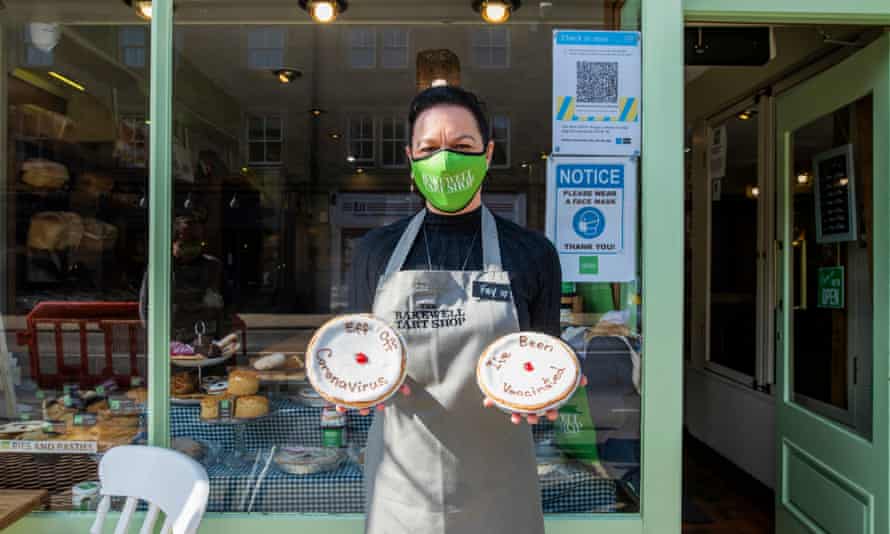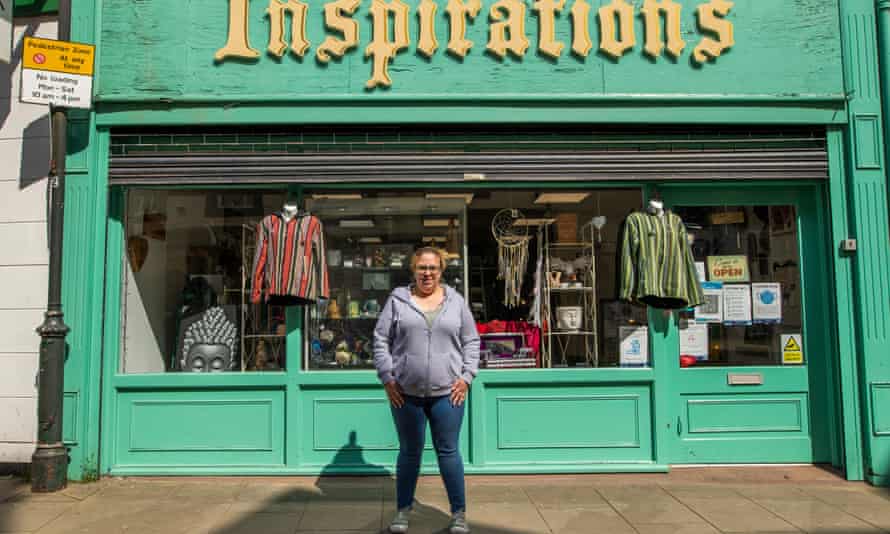On the coronavirus map of Britain, the Derbyshire Dales has reached epidemiological nirvana. The region of 72,000 people has recorded only nine Covid cases in the past fortnight, making it one of the least-infected places in the country.
But as shops, beauticians and beer gardens reopened for the first time in months, a reason for caution is on the horizon. In the market town of Mansfield, 15 miles from the Peak District, cases have rocketed after two large school outbreaks. It now has the highest infection rate in England.
It is a reminder, if any were needed, that despite a tentative step towards normality this week, Britain is not yet out of the woods. “We’re not too worried but we think more with business heads than with emotional heart,” said Duncan Kirk, the co-owner with his wife, Fay, of the popular Bakewell Tart shop and coffee house.
The Kirks took over the cafe in Bakewell in December 2019 having returned from Australia after 16 years to fulfil their dream of running a hospitality business. They spent £40,000 revamping the shop but were open for only one weekend before the first lockdown last March.

In the 17 months since they bought the cafe, the couple have had only 14 weeks of semi-normal trade. Customers filled the pretty courtyard on Friday lunchtime but until people can sit inside, at the earliest on 17 May, Duncan Kirk said the cafe would struggle to make earnings match outgoings. Still, they have adapted: hand-sized bakewell tarts adorned with “Eff off coronavirus” have flown off the shelves, while treats saying “I’ve been vaccinated” are beginning to take off.
At the Wheatsheaf pub, the manager Lars Godley deals with an early rush of families for Friday lunch. Almost all of the 14 tables outside the pub are full by 11am. It is busier than he expected. Long queues have formed outside most of the town’s fish-and-chip shops by lunchtime.
“We’ve had a perfect storm of good weather and the general hype of pubs reopening,” said Godley, anticipating a “crazy weekend” ahead in the chilly sunshine. Customers, he said, had been really understanding of the Covid-safe changes at the pub – mask-wearing indoors, test-and-trace sign-in when seated.
Almost all visitors are from further afield. At the Bakewell visitor centre, a staff member politely directs tourists to the famous Monsal trail walk. “Since Tuesday when all the self-catering and the caravans reopened we’ve noticed a huge influx,” she said. The Peak District attracts more than 13 million visitors each year. This year, with fewer people taking foreign holidays, that is expected to rise.
Godley, 27, was happy to welcome drinkers back to the Wheatsheaf but he was anxious it might be too soon. “I think it’s a bit ridiculous how the government has handled things,” he said. “I don’t think we should be opening yet personally … I can still see there will be pitfalls ahead.”
In Mansfield, school outbreaks have sent its infection rate to four times the national average, with 99 cases per 100,000 people, the highest in England. Many of the cases were among younger people, said Jonathan Gribbin, the director of public health for Nottinghamshire, but half were of people of working age.

“I think it’s going to fluctuate up and down wherever you are, it’s just about keeping yourself safe,” said Linda Marie Woolley, 42, a teaching assistant, as she queued outside Primark on her first trip out since lockdown eased on Monday.
Down the street at Inspirations, an alternative gift and jewellery shop, Rachael Martin, 31, said customers had been thrilled to be back but some were still too scared to venture outside. Martin said she thought some young people still didn’t understand the severity of Covid if it hadn’t affected them directly. “I think you still get some that don’t give a hoot about the rules, especially teenagers. I work evenings and I see groups of eight to 16 teenagers hanging around. And what do you say to them, because they just want to have a life?”
For John Skotulanski, the owner of Games Emporium, it seems to be more often the older generation being lax with the rules. “I find that when people have their vaccine, they seem to think they’re fine but they’re not,” he said. “If anything it’s probably the older people we do have to remind about mask wearing.”
When Covid first struck, some locals erected “stay away” signs around Bakewell. Derbyshire police gained a heavy-handed reputation for exposing lockdown-busting day trippers by sharing drone images of their cars.

The area has had painful experience of outbreaks. It was badly hit by foot-and-mouth disease in cows and sheep in 2001. “This area was really badly impacted and that scared a lot of people here. It sticks a long time in memories,” said Kirk. Just six miles north of Bakewell is Eyam, the “plague village” famous for shutting itself off from England when the Black Death arrived in a parcel of cloth from London in 1665, wiping out a third of its population.
In Perfect Gifts, Anna Travis said the first week of opening had been a “mixed bag” for her shop and that some people still appeared anxious. “Some are still nervous. Some people wait for the shop to be completely empty before they come in. I always have the door open for ventilation because that’s key,” she said.
Back at the Bakewell Tart cafe, the ever-optimistic Kirks were praying for sun, vaccines and an influx of socially distanced customers: “We need another brilliant summer. Bakewell needs a brilliant summer.”
This content first appear on the guardian

Muchas gracias. ?Como puedo iniciar sesion?